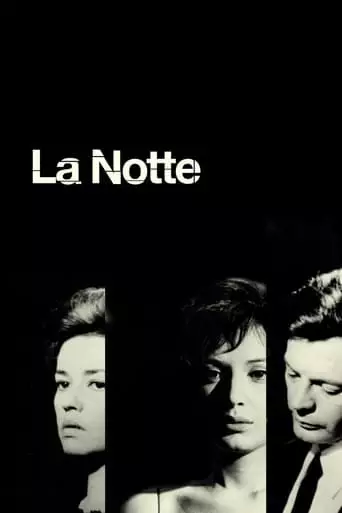
A day in the life of an unfaithful married couple and their steadily deteriorating relationship in Milan.
La Notte (The Night), directed by Michelangelo Antonioni, is a profound exploration of alienation, existential crisis, and the disintegration of personal relationships. The film focuses on the unraveling marriage of Giovanni (Marcello Mastroianni), a successful but emotionally detached writer, and his wife Lidia (Jeanne Moreau), a woman struggling with her own sense of purpose and love. The narrative takes place over the course of a single night in Milan, during which the couple attends a party hosted by a wealthy industrialist, Mr. Gherardini, and his family.
The film opens with Giovanni visiting a hospital where he meets a young woman who is romantically interested in him. Later, at the party, Giovanni is distracted by the flirtations of the hostess’s daughter, Valentina (Monica Vitti), while Lidia becomes increasingly despondent, feeling disconnected from both her husband and the world around her. Throughout the evening, their interactions with others and with each other reveal the deep emotional voids in their marriage. As the night progresses, the couple’s disillusionment reaches a breaking point, culminating in a quiet, poignant scene where they acknowledge their love for each other but also the impossibility of rekindling it.
La Notte is an exploration of modern existential dilemmas, focusing on the alienation and emotional paralysis that often accompany contemporary life. Antonioni’s direction is marked by a cold, detached visual style, emphasizing the emotional and psychological distance between characters. The urban setting of Milan, with its towering skyscrapers and sterile architecture, reflects the characters’ inner emptiness and the erosion of personal connection.
One of the central themes of La Notte is the decline of intimacy and communication in relationships. Giovanni and Lidia’s marriage is marked by a lack of emotional engagement, symbolized by their inability to connect meaningfully despite being in close physical proximity. Their relationship is further strained by Giovanni’s infidelity and Lidia’s growing sense of disillusionment with both her marriage and her place in the world.
The film also explores the idea of existential isolation, as both characters grapple with feelings of disconnection from their surroundings and the people they encounter. Lidia’s emotional struggles are portrayed through her interactions with others, particularly with Valentina, who represents youth and vitality, qualities that Lidia feels she has lost. The film’s narrative is less about plot and more about the psychological states of its characters, making it a profound meditation on the human condition.
La Notte is widely regarded as a key work in the development of modern cinema, particularly in its treatment of alienation and existential themes. Antonioni’s minimalist approach to storytelling, where much of the drama unfolds through subtle gestures and lingering silences, was groundbreaking at the time and has influenced many filmmakers since. The film’s stark portrayal of a marriage in crisis resonated deeply with audiences, reflecting the growing disillusionment of the post-war generation.
The film’s visual style, with its use of long takes and carefully composed shots, creates a sense of emotional distance and introspection, allowing viewers to immerse themselves in the characters’ internal worlds. The urban landscape of Milan, often shot in cold, clinical tones, serves as a metaphor for the emotional and psychological barrenness of the characters’ lives.
After watching La Notte, you will likely feel a sense of melancholy and introspection. The film’s portrayal of a marriage in decline and the emotional void between its characters can evoke a deep emotional response. The film’s slow pace and minimalist style invite contemplation, leaving you to reflect on the nature of human relationships and the existential struggles that define the human condition.
The film’s open-ended conclusion, where Giovanni and Lidia’s relationship remains unresolved, may leave you with a sense of unresolved tension. While there is no clear resolution, the emotional depth and authenticity of the characters’ experiences will linger with you long after the film ends. You may find yourself reflecting on your own relationships and the complexities of love, intimacy, and personal fulfillment in a modern, often alienating world
